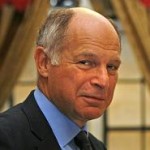Share it
 Lord Neuberger of Abbotsbury has been sworn in as the new President of the Supreme Court of the United Kingdom this morning, taking over from Lord Phillips of Worth Matravers. Lord Neuberger becomes the second president of the Supreme Court since its opening in October 2009.
Lord Neuberger of Abbotsbury has been sworn in as the new President of the Supreme Court of the United Kingdom this morning, taking over from Lord Phillips of Worth Matravers. Lord Neuberger becomes the second president of the Supreme Court since its opening in October 2009.
As outlined in a previous post Lord Neuberger was appointed a High Court judge in the Chancery Division in 1996 and was the Supervisory Chancery Judge for the Midlands, Wales and Chester and Western Circuits between 2000 and 2004. He was appointed a Lord Justice of Appeal in 2004, and his promotion to Lord of Appeal in Ordinary two years later made him the youngest law lord at age 58. In July 2009, in a move he later referred to as an “elective demotion”, Neuberger left the Appellate Committee of the House of Lords to become Master of the Rolls.
Following Lord Neuberger’s return to the highest court in the land Lord Dyson, previously a member of the Supreme Court, has now taken on the position of Master of the Rolls. In a press release from the Court today Lord Neuberger said:
“It is a great honour to have been asked to lead the UK Supreme Court, which is rightly respected throughout the world for the quality of its decision making. It has also been forging a reputation for accessibility and transparency, welcoming many visitors and providing public information about the work of the Justices and summaries of cases being heard.
“I welcome the opportunity to work with the other Justices of the Supreme Court, to continue developing relationships with colleagues around the UK, to serve all parts of the Kingdom, and to maintain the independence of the judiciary as one of the foundations of a stable, safe and prosperous society based on the rule of law.”
The swearing in ceremony was a simple affair. Lord Neuberger took the Judicial Oath and the Oath of Allegiance before shaking the hands of each of the Justices in turn. The Justices then processed to Westminster Abbey with other judges and members of the legal profession for annual service that marks the beginning of the legal year in England and Wales.
The role of the President of the Supreme Court a varied one. As well as providing leadership within the Court, the President is responsible for leading discussions with the Lord Chancellor over policy and resource issues that affect the Supreme Court. During his presidency Lord Phillips publicly voiced his concerns over the current governmental funding arrangements of the Supreme Court, referring to a tendency on the part of the MoJ to try to annex the Supreme Court as “an outlying part of its empire”. His comments received a robust response from the then Justice Secretary, Kenneth Clarke, who referred to it as a “storm in a teapot’”.
It will be interesting to see what sort of relationship develops between the new President and the current Justice Secretary, Chris Grayling, who is the first non-lawyer to hold the position. Lord Neuberger has a history of being outspoken on a range of issues, not least in his criticism of the Supreme Court, which at the time of its inception he described as having been created “as a result of what appears to have been a last-minute decision over a glass of whisky”. He headed an inquiry into widening access to the Bar and in 2006-07 he served as a member of the Panel on Fair Access to the Professions. He has questioned government plans to reduce legal aid and he recently spoke out against the hourly billing rates charged by lawyers and the inefficient practices this leads to. Yet, Lord Neuberger asserts that parliamentary sovereignty is absolute and remains cautious on the matter of court interference in government policy. It remains to be seen whether Lord Neuberger’s willingness to criticise government policy continues in his new office.



1 comment
Adebayo Adekunle Oyagbola said:
04/10/2012 at 23:13
A truly civilised affair. Is a convention born for the Rolls to be a footstep to presidency of the Supreme Court? I guess time will unfold all.